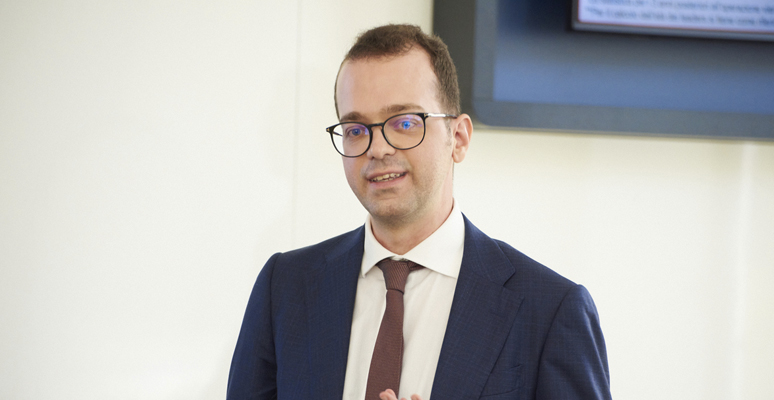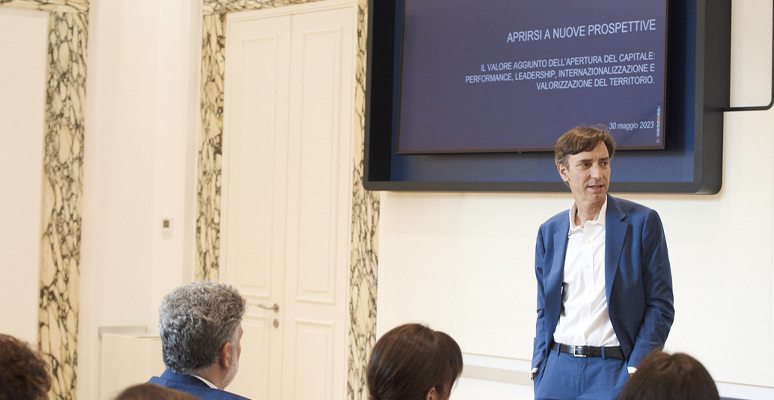
- Start date
- Duration
- Format
- Language
- 14 May 2025
- 9 days
- Class
- Italian
Per ampliare la propria visione attraverso soluzioni ad ampio spettro in grado di generare valore.
The Corporate Governance Lab of SDA Bocconi, directed by Alessandro Minichilli, has published the first report of its Observatory for "Sustainable Growth, Internationalization and Capital Opening", which counts with NUO SpA as it’s main partner. The study, presented by Joao Pedro Bastos Castilho (Knowledge Analyst at CG Lab) and Simone Oddo (Investment Manager at NUO SPA) and discussed together with a panel of professors, businesswomen, entrepreneurs and managers during a dedicated event, offers first of its kind findings on the impact of the choice of Italian companies to open their capital to financial investors -- a trend that is currently increasing in the country. The research is focused on Corporate Governance and economic performance of about 300 Italian companies with over 50 million euros in turnover.
Firms that choose to open their capital structure are predominantly family-owned and, on average, present a medium-high Governance level in the year before the deal (3.39 out of 5, as measured by CG Lab's Corporate Governance Index); moreover, their Governance improves in the year immediately after the deal closure (+0.14 CGI point). The changes put up by new financial partners lead to larger Board of Directors mainly due to an increase in the average number of outside directors, a a finding emphasized by Luca Ferrari (co-founder and CEO of Bending Spoons) for whom "an outside director is useful once it adds complementary skills to those already possessed within the BoD." In addition, Boards after deals present a higher level of independency (the average percentage of family directors is halved after three years), however their diversity level is reduced due to the decline in the average percentage of women inside the BoDs.

Furthermore, the research shows that in almost two-thirds of the cases analyzed, changes are made to leadership models after the deals. Such mainly promote a shift to a single leadership structure (which was the case for 71% of the observations where a leadership model change occurred). In the remaining cases, the invariance of leadership models, however, does not mean an absence of change: on the contrary, in more than 80% of these cases new and often younger (the average age goes from 60 to 53) leaders are appointed after the deals. All of this brings to light the fact that, and as stated by Daniela Montemerlo (professor of SDA Bocconi and Università dell’Insubria), "the importance for companies to start strengthening their governance even before they begin interacting with potential financial partners: as the study shows, for them good governance is relevant, both in the investment selection phase and after entering the capital structure."
In terms of strategy, capital opening proves to be a clear driver of firms’ internationalization, with the average number of overseas subsidiaries doubling 3 years after the deal. On this aspect, Stefania Martelli (President of Ludovico Martelli SpA) shared her experience of opening the capital: "the financial partner has been essential in the process of building up the brand abroad, thanks to a contribution of capital but also of courage."
With respect to economic and financial performance, the study proposes a comparison between firms that opened their capital structure and a sample of firms that remained closed and shared similar characteristics with those subject to a deal prior to the deal itself. The comparison shows that firms engaged on capital opening to a financial partner achieved better results, more specifically: significantly higher average annual revenue growth, higher EBITDA and ROA, and a significant increment to the Italian labor market in terms of job creation compared to the near-stable employment level of firms that remained closed. On such aspects, Isabella Traglio (Executive Board Member of Vhernier SpA) highlighted that "a financial partner can be a support in the presence of a well-defined vision and a clear strategic plan, being also consistent with the specificities of each economic sector."

Finally, it was highlighted how the challenges of today's world require not only choices of capital openness but, prior to that, a cultural openness combined with a sense of responsibility towards all stakeholders - and thus towards a representative Governance as noted by Giuseppe Morici (Operating Partner of NUO SpA). On top of that, the engagement of third-party actors capable of fostering knowledge acquisition and the expansion of the network of relationships is also crucial, as argued by Marta Testi (CEO of ELITE). Tommaso Paoli (CEO of NUO SpA) concluded the works by emphasizing "the need, for all companies, of a sartorial approach to governance in order to support the corporate continuity and independence in the long term."
SDA Bocconi School of Management

Per ampliare la propria visione attraverso soluzioni ad ampio spettro in grado di generare valore.

Un percorso formativo che assicura lo sviluppo di una conoscenza delle metodologie di analisi e previsione dei risultati trasversale alle tre anime delle funzioni AFC (Amministrazione, Finanza e Controllo).

Il corso fornisce indicazioni operative volte a ottimizzare la gestione dei dati, valutando le opportunità alternative disponibili per la propria azienda e valorizzando al meglio il contenuto informativo dei dati stessi.